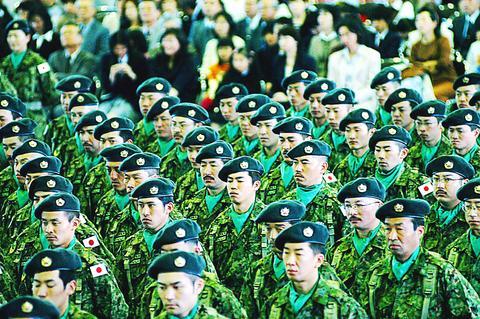Japan may extend its deployment of troops in southern Iraq if the security situation in the country does not change, a top government official said yesterday.
Chief Cabinet Secretary Hiroyuki Hosoda said, however, that the government has made no final decision yet.

PHOTO: EPA
"If the situation remains the way it is now, I think it's necessary for Japan to continue to get actively involved," said Hosoda. When asked if an extension was possible, Hosoda said, "Yes."
Some 500 Japanese troops on a non-combat, humanitarian mission in the Iraqi city of Samawah are slated to come home in December this year. Another 500 are based in neighboring Gulf states providing support.
The Nihon Keizai Shimbun reported yesterday that the Cabinet was expected to approve an extension of about one year before December, and that foreign ministry and defense officials have already notified Washington.
A Defense Agency spokeswoman declined to comment on the report.
The mission has faced strong opposition at home, where many fear the troops could get drawn into fighting in violation of Japan's pacifist constitution.
Critics have also charged that Japan's high-profile support of the US makes it an increasingly likely target of terrorism.
Hosoda said the government would keep a close watch on the terrorism problem and changes involving the new government in Iraq in making its final decision.
"We will to decide after evaluating the overall situation, including Iraq's reconstruction and security situation," he said.
NHK public broadcaster reported that Iraqi Prime Minister Ayad Allawi asked Prime Minister Junichiro Koizumi to keep Japanese troops in Iraq, when the two leaders met in New York on the sidelines of the UN General Assembly session.
Koizumi, emphasizing the need for stability in Iraq, responded that Japan intended to continue doing its utmost for the country's reconstruction, NHK said.

VAGUE: The criteria of the amnesty remain unclear, but it would cover political violence from 1999 to today, and those convicted of murder or drug trafficking would not qualify Venezuelan Acting President Delcy Rodriguez on Friday announced an amnesty bill that could lead to the release of hundreds of prisoners, including opposition leaders, journalists and human rights activists detained for political reasons. The measure had long been sought by the US-backed opposition. It is the latest concession Rodriguez has made since taking the reins of the country on Jan. 3 after the brazen seizure of then-Venezuelan president Nicolas Maduro. Rodriguez told a gathering of justices, magistrates, ministers, military brass and other government leaders that the ruling party-controlled Venezuelan National Assembly would take up the bill with urgency. Rodriguez also announced the shutdown

Civil society leaders and members of a left-wing coalition yesterday filed impeachment complaints against Philippine Vice President Sara Duterte, restarting a process sidelined by the Supreme Court last year. Both cases accuse Duterte of misusing public funds during her term as education secretary, while one revives allegations that she threatened to assassinate former ally Philippine President Ferdinand Marcos Jr. The filings come on the same day that a committee in the House of Representatives was to begin hearings into impeachment complaints against Marcos, accused of corruption tied to a spiraling scandal over bogus flood control projects. Under the constitution, an impeachment by the

China executed 11 people linked to Myanmar criminal gangs, including “key members” of telecom scam operations, state media reported yesterday, as Beijing toughens its response to the sprawling, transnational industry. Fraud compounds where scammers lure Internet users into fake romantic relationships and cryptocurrency investments have flourished across Southeast Asia, including in Myanmar. Initially largely targeting Chinese speakers, the criminal groups behind the compounds have expanded operations into multiple languages to steal from victims around the world. Those conducting the scams are sometimes willing con artists, and other times trafficked foreign nationals forced to work. In the past few years, Beijing has stepped up cooperation

Exiled Tibetans began a unique global election yesterday for a government representing a homeland many have never seen, as part of a democratic exercise voters say carries great weight. From red-robed Buddhist monks in the snowy Himalayas, to political exiles in megacities across South Asia, to refugees in Australia, Europe and North America, voting takes place in 27 countries — but not China. “Elections ... show that the struggle for Tibet’s freedom and independence continues from generation to generation,” said candidate Gyaltsen Chokye, 33, who is based in the Indian hill-town of Dharamsala, headquarters of the government-in-exile, the Central Tibetan Administration (CTA). It